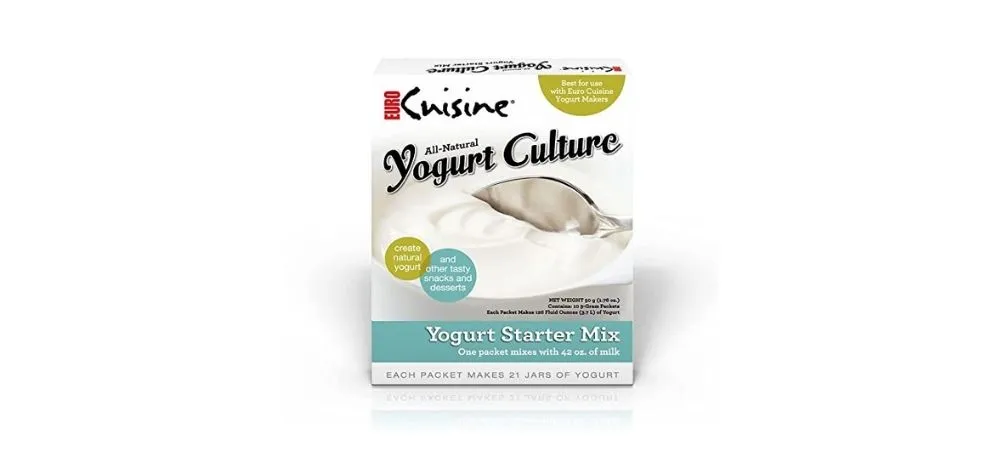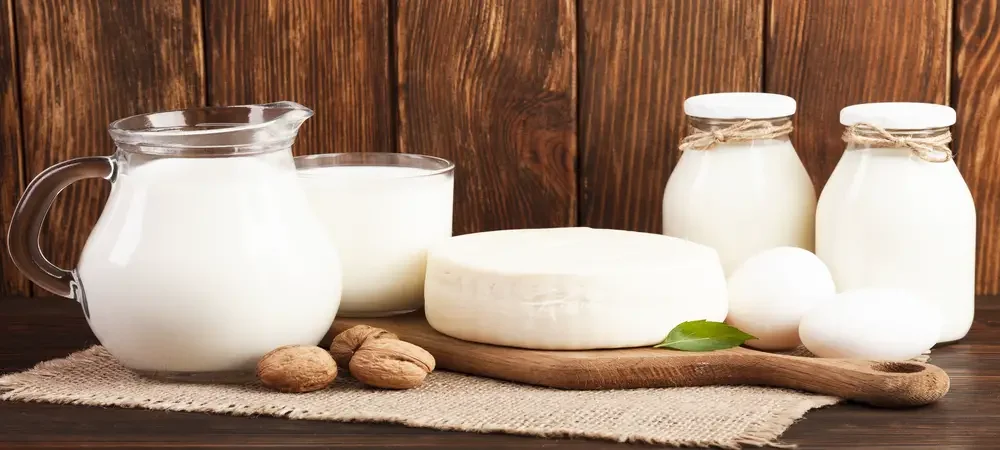Yogurt is a quick snack that is full of valuable nutrients. Unfortunately, not everyone likes to eat it regularly because of taste and maybe some lactose intolerance concerns. In the event when you want something like yogurt, use one of these 12 substitutes instead!
1. Kefir
If eating yogurt for health reasons (other than milk allergy), you should know that kefir is even better. The word ‘kefir’ comes from the Turkish language and means “feeling good.” This dairy drink has been used for centuries as a natural remedy for many problems: constipation, allergies, inflammation.
But what’s important about it is that it’s a good source of calcium, vitamins, and probiotics.
2. Acidophilus milk
Acidophilus milk doesn’t contain cow’s milk but soybeans which makes it suitable for vegans. This drink is also rich in beneficial bacteria that can improve digestion and prevent some diseases. Plus, it’s lactose-free, gluten-free, and doesn’t contain any cholesterol.
3. Almond milk
Almond milk has a lighter taste than any other substitute, but don’t be fooled. It’s still creamy and delicious! It can also be used in cooking or for coffee. The best part about this milk is that you don’t need to only stick with the basic one; there are many flavors available today, like vanilla, chocolate, and coconut.
4. Coconut milk
Coconut milk contains healthy fatty acids that can reduce cholesterol levels in the blood, which is very important for heart health. It’s also rich in vitamins E and B, potassium, and magnesium. Moreover, it has a lot fewer calories than other animal milk but the same amount of calcium.
For baking, it is a perfect yogurt substitute with a ratio of 1:1 to follow during substitution.
5. Rice milk
Rice milk is a good alternative for people who have lactose intolerance or are vegan. It’s easy to digest and doesn’t contain any saturated fat, which makes it suitable for children, too. However, rice milk lacks some of the nutrients (like calcium) found in other dairy-free milk.
6. Mayo
For sandwiches and salads, replacing yogurt with Mayo is an excellent idea. Mayo is rich in vitamin K and D, so it’s a perfect substitute for people who don’t eat dairy products. Also, some brands contain probiotics that can boost your immune system.
7. Cottage Cheese
The curdling of milk with the hint of salt makes Cottage cheese a perfect substitute for yogurt. It contains calcium and protein, which are great for strong bones. So, next time, if you are out of yogurt, garnish your sandwiches with cottage cheese to enhance their flavor.
8. Sour cream/Creme Fraiche
Being a delicious addition to dishes, Sour Creme can also be used as a substitute for yogurt. Like mayo, it’s rich in vitamin K., make sure that you’re buying only organic sour creme to avoid additives and taste enhancers.
9. Cheese
Who would give up cheese? Yes, there is a dairy-free type containing many healthy ingredients like calcium and vitamin D. On top of everything, it’s lactose-free and doesn’t contain cholesterol. All you need to do is make sure that you buy this milk instead of regular cheese because many brands add unhealthy additives to their products.
10. Cream Cheese
It is another savory worth cherishing that can substitute the yogurt perfectly. It is an excellent ingredient to fit in every place, including your heart, from dips to desserts.
Cream cheese is a perfect food to keep you healthy, starting with the high protein and calcium content. So, the next time your child asks for cream cheese sandwiches, try this dairy-free deliciousness instead of a regular one.
11. Heavy Cream/Whipping Cream
Just as sour creme, heavy cream contains many nutrients, like folic acid and potassium. So, if you want to substitute yogurt with heavy cream, exclude the additives in it.
12. Sour Milk
Sour milk is another good choice for those willing to move on from yogurt but still have a hint of sourness in their dishes or drinks. It has many healthy fatty acids that can lower cholesterol levels, reduce the risk of hypertension and even help people get into shape.
All you need to remember is this: not all milk brands don’t have probiotics, so be careful with what you’re buying next time!
Reasons for Seeking Yogurt Substitutes
There are various reasons why someone might seek yogurt substitutes in their recipes or daily consumption. Some of the most common reasons include dietary restrictions, taste preferences, and availability.
-
Dietary restrictions
a. Lactose intolerance and dairy allergies: Some individuals are lactose intolerant or have a dairy allergy, making it difficult for them to digest yogurt and other dairy products. In such cases, it is essential to find suitable non-dairy substitutes that can still provide the desired taste and texture in recipes without causing digestive discomfort or allergic reactions.
b. Veganism and plant-based diets: People following a vegan or plant-based diet avoid consuming animal products, including dairy. For these individuals, plant-based yogurt substitutes can provide similar taste and texture while adhering to their dietary principles.
c. Calorie and fat content considerations: Those who are trying to reduce their calorie or fat intake may also seek yogurt substitutes. Lower-fat or calorie alternatives can provide a healthier option without sacrificing taste and texture in various dishes.
-
Taste preferences
Some people might not enjoy the taste of yogurt or may want to experiment with different flavors and textures in their recipes. In such cases, using a yogurt substitute can provide an opportunity to explore new tastes while maintaining the desired consistency and texture in the final product. For example, using a coconut milk yogurt substitute can add a tropical flair to a dish, while a cashew-based yogurt can lend a richer, creamier texture.
-
Availability
Yogurt might not always be readily available in certain regions or at specific times. For instance, people living in remote areas or traveling may have limited access to fresh yogurt. In these situations, finding a suitable yogurt substitute can help maintain the recipe’s integrity while ensuring that the dish can still be prepared and enjoyed. Additionally, using substitutes can sometimes be more cost-effective, depending on local market prices and seasonal availability.
Tips for choosing the right yogurt substitute
When selecting the right yogurt substitute, it is important to consider the recipe’s purpose, balance flavors and textures, and account for dietary restrictions and preferences. By keeping these factors in mind, you can make informed decisions and create delicious dishes that cater to various needs and tastes.
A. Considering the recipe’s purpose
The role of yogurt in a particular recipe will significantly influence the choice of an appropriate substitute. Yogurt can serve various purposes, such as adding moisture and tenderness to baked goods, providing a tangy flavor, or acting as a thickening agent in sauces and dressings. Understanding the function of yogurt in the recipe will help you select a substitute that can fulfill the same purpose.
For instance, when yogurt is used as a tenderizing agent in a marinade, buttermilk can be an excellent alternative. If yogurt acts as a thickening agent in a sauce, a dairy-based option like sour cream or a plant-based alternative like coconut milk yogurt could be more suitable.
B. Balancing flavors and textures
When choosing a yogurt substitute, it’s crucial to consider how the substitute’s flavor and texture will affect the final dish. Each substitute has its unique flavor profile and consistency, which may alter the overall taste and texture of the recipe.
For example, if you’re looking for a substitute with a tangy flavor similar to yogurt, buttermilk or sour cream can be a good choice. On the other hand, if you prefer a milder taste, you may opt for a less tangy option like crème fraîche. Additionally, consider the texture of the substitute. If a recipe requires a smooth consistency, choose a substitute that can easily be blended or whisked, such as silken tofu or blended cottage cheese.
C. Accounting for dietary restrictions and preferences
When selecting a yogurt substitute, it’s essential to consider the dietary needs and preferences of those who will be consuming the dish. If you or someone you’re cooking for has a lactose intolerance or dairy allergy, opt for plant-based alternatives like soy, almond, or coconut milk yogurt. Similarly, if you’re preparing a dish for someone following a vegan or plant-based diet, ensure the substitute is free from animal products.
Additionally, keep in mind any personal taste preferences or specific dietary goals, such as reducing calorie or fat intake. For instance, if you’re looking for a low-fat option, consider using applesauce or mashed avocado in place of yogurt when baking.
By considering the recipe’s purpose, balancing flavors and textures, and accounting for dietary restrictions and preferences, you can choose the right yogurt substitute to create delicious and satisfying dishes for everyone to enjoy.
Conclusion
Different types of milk substitutes are widely available these days, and it’s up to you which one is your favorite. It can be an animal-free option like soy or a dairy one like cream cheese.
Either way, as long as you choose something healthy and tasty, nothing can stop you from getting rid of that yogurt.










